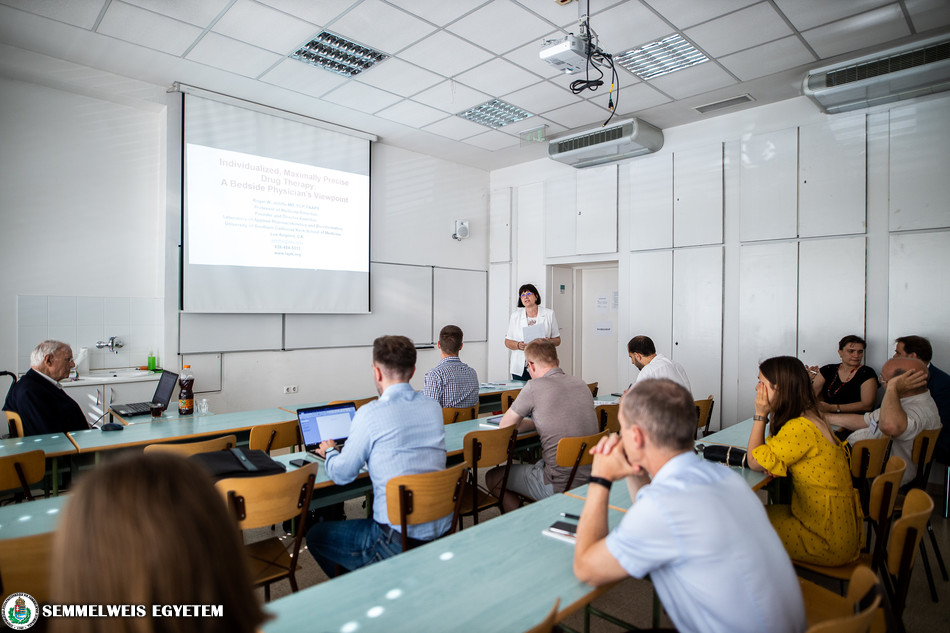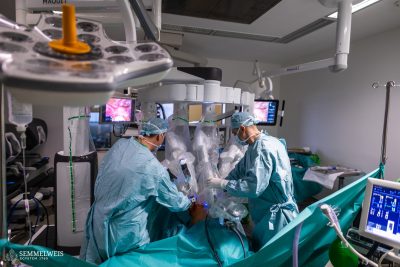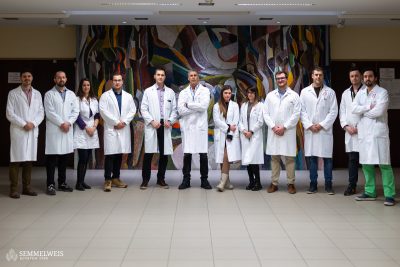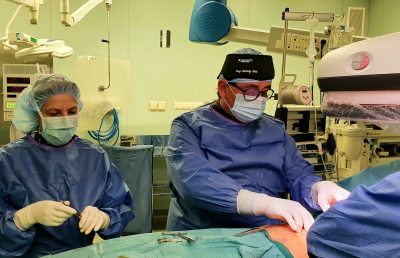A full-day workshop was held at Semmelweis University on individualized drug therapies by Dr. Roger Jelliffe, an international expert on the topic, where he emphasized that the approach has benefits for clinicians, patients, as well as society. Treating each patient individually is a multidisciplinary task, which requires the cooperation of many involved parties, said Dr. Ibolya Kocsis, deputy director of the Department of Laboratory Medicine, who organized the workshop.
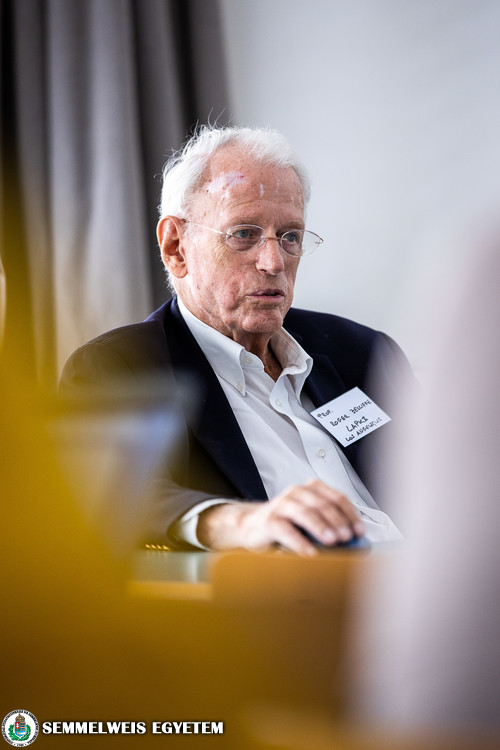 “Each patient is different, which means that even under the same conditions, they react differently to the same drug. Some need a higher, some a lower dosage of the same drug even in the case of the same disease,” explained in an interview to our website Dr. Roger Jelliffe, who held the workshop and who is a cardiologist, clinical pharmacologist and professor of medicine. The renowned expert is professor emeritus of the University of Southern California, and the founder and director emeritus of the Laboratory of Applied Pharmacokinetics and Bioinformatics (LAPKB) at the Children’s Hospital of Los Angeles. The professor said that individualized drug therapy, instead of choosing to target having the blood serum concentrations of patients within a given range as a result of the administered drugs, tries to look after the needs of each individual patient. “This means that based on the patient’s unique personal attributes and needs, we set a specific target value we want to achieve for the concentration of the drug in the patient’s blood, which we then try to hit with maximum precision,” said Dr. Jelliffe, adding that this is what the software he and his team have developed – and whose use was demonstrated at the workshop – helps doctors to achieve. He further explained that the software uses data that is input, such as the patient’s age, sex, height, weight and kidney function index, as well as the precise serum concentration that the doctor wishes to achieve at a given time. In turn, the program provides the drug regimen, including the dosage and timing, that is needed to hit the target value with maximum precision. The benefits of this approach are that less drugs are needed, and thus less side effects caused, thus making treatment more efficient, benefiting physicians, patients, and society as well, he pointed out.
“Each patient is different, which means that even under the same conditions, they react differently to the same drug. Some need a higher, some a lower dosage of the same drug even in the case of the same disease,” explained in an interview to our website Dr. Roger Jelliffe, who held the workshop and who is a cardiologist, clinical pharmacologist and professor of medicine. The renowned expert is professor emeritus of the University of Southern California, and the founder and director emeritus of the Laboratory of Applied Pharmacokinetics and Bioinformatics (LAPKB) at the Children’s Hospital of Los Angeles. The professor said that individualized drug therapy, instead of choosing to target having the blood serum concentrations of patients within a given range as a result of the administered drugs, tries to look after the needs of each individual patient. “This means that based on the patient’s unique personal attributes and needs, we set a specific target value we want to achieve for the concentration of the drug in the patient’s blood, which we then try to hit with maximum precision,” said Dr. Jelliffe, adding that this is what the software he and his team have developed – and whose use was demonstrated at the workshop – helps doctors to achieve. He further explained that the software uses data that is input, such as the patient’s age, sex, height, weight and kidney function index, as well as the precise serum concentration that the doctor wishes to achieve at a given time. In turn, the program provides the drug regimen, including the dosage and timing, that is needed to hit the target value with maximum precision. The benefits of this approach are that less drugs are needed, and thus less side effects caused, thus making treatment more efficient, benefiting physicians, patients, and society as well, he pointed out.
Dr. Jelliffe noted that he believed the education of physicians on this type of treatment is very important, which is the purpose of the workshops he holds around the world. He added that the approach is currently being used, with positive results, at the Los Angeles Children’s Hospital, in France, where they have a good therapy individualization service for transplant patients, and in Norway for renal transplants.
The modern therapeutic drug monitoring (TDM) service of the Department of Laboratory Medicine, a key component of individualized drug therapy, has recently expanded significantly and continues to expand, with the application of the latest approaches and technologies. This was aided primarily by the establishment of the department’s Laboratory of Mass Spectrometry and Separation Technology, Dr. Gellért Karvaly, the head of the laboratory, at whose invitation Dr. Jelliffe visited Hungary, told our website. He added that at present, uniquely in Hungary, the department is able to perform TDM of around 40 drugs for clinicians at short notice, they own the software developed by Dr. Jelliffe’s team, and they also possess the required know-how to use it. In the future, their main goal is to integrate TDM services into modern clinical practice, by providing full-scale laboratory support for individualized drug therapies coordinated by clinicians, said Dr. Gellért Karvaly, adding that they also consider it an important task to increase the awareness and acceptance of this approach among professionals. There is also great scientific potential in related clinical research, which could form the basis of later successful collaborations on therapies, he noted.
In her welcome remarks opening the workshop, Dr. Ibolya Kocsis, deputy director of the Department of Laboratory Medicine, noted that the individualization of drug therapy is a multidisciplinary task, requiring the expertise and empathy of the clinician, knowledge about the clinical pharmacology of the applied drug, and the cooperation of the clinical laboratory. She added that drug misuse resulting in inefficiency is an ever-growing problem, which places an increasing burden on the health care system and society. She pointed out that this is the third workshop held on individualized therapy with the participation of Dr. Jelliffe, after ones held in the previous two years, which have all been international events attended by participants from countries such as the Czech Republic, Germany and Slovakia, with a guest from Serbia joining for the first time this year.
Tamás Deme
Photo: Gábor Ancsin
